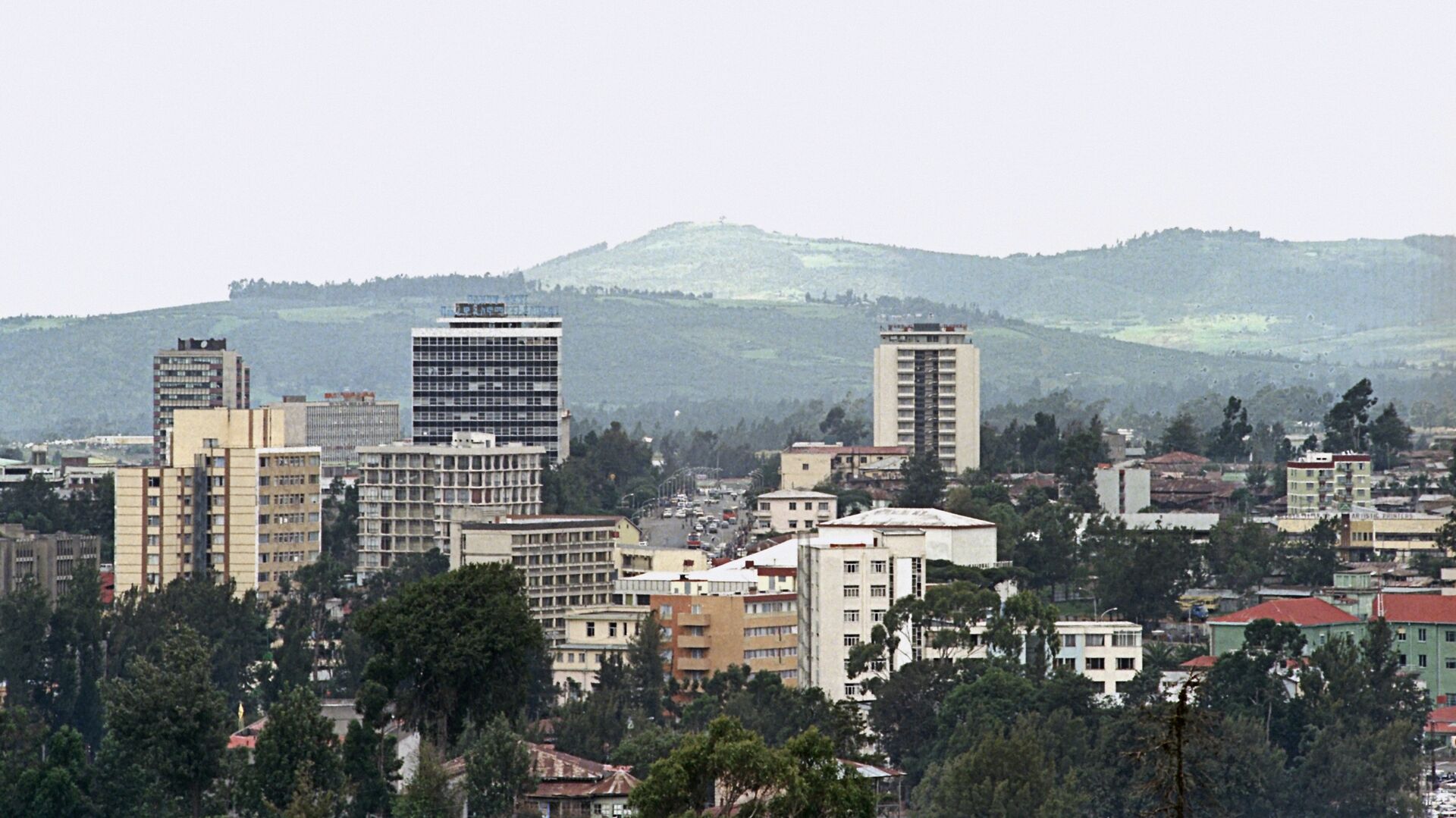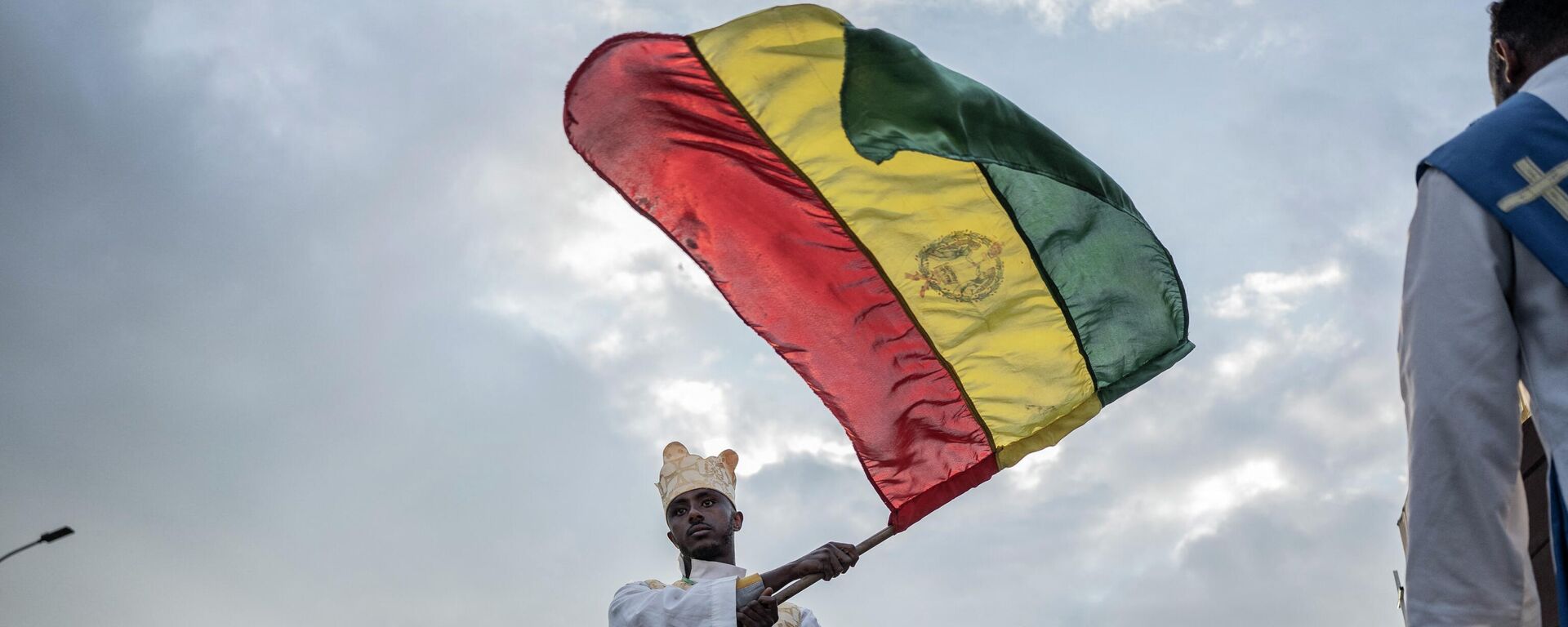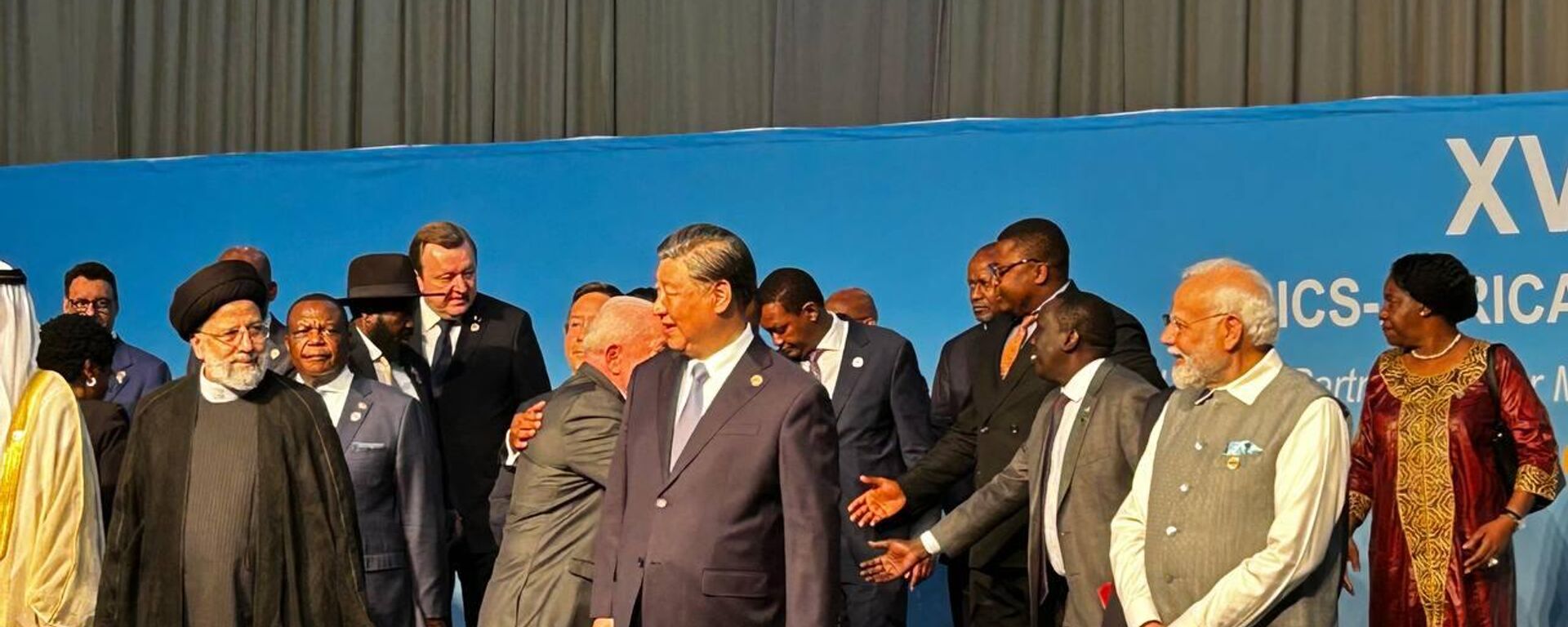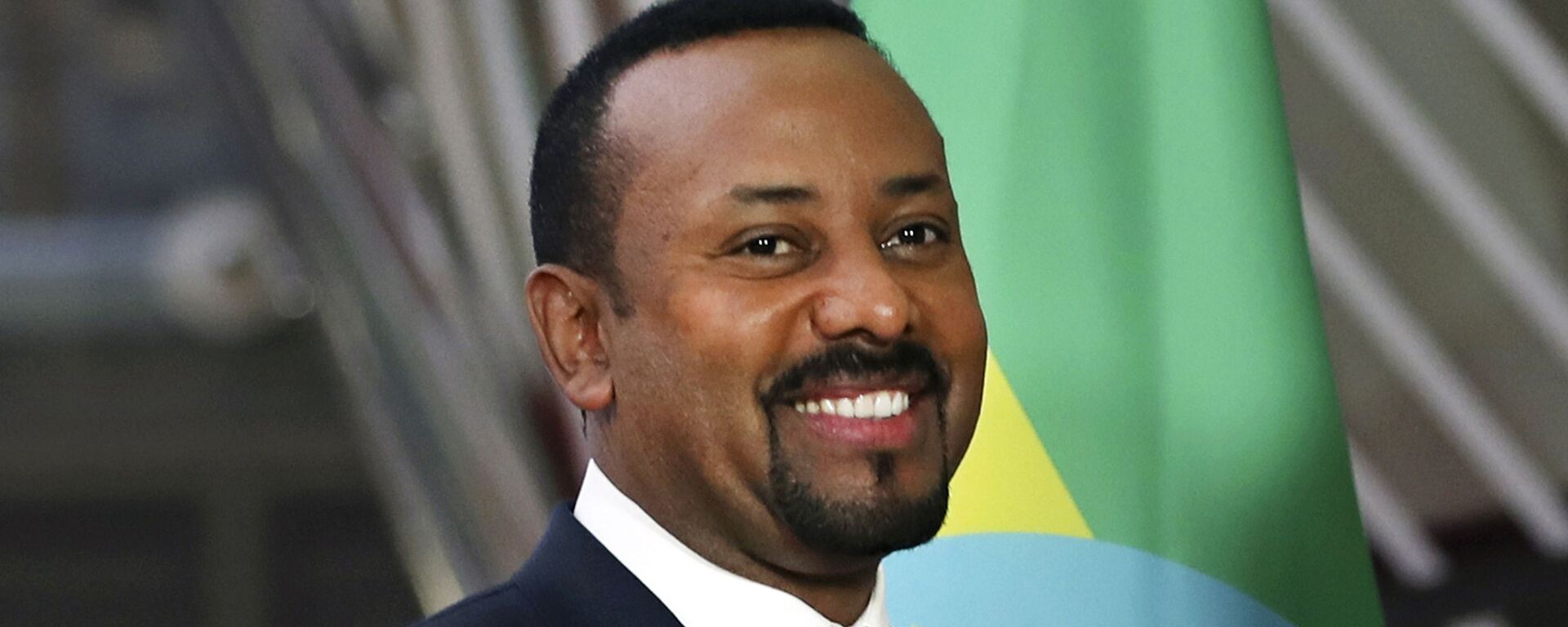https://en.sputniknews.africa/20230825/ethiopias-brics-entry-offers-win-win-prospects-political-expert-reveals-1061618301.html
Ethiopia's BRICS Entry Offers 'Win-Win' Prospects, Political Expert Reveals
Ethiopia's BRICS Entry Offers 'Win-Win' Prospects, Political Expert Reveals
Sputnik Africa
The historic 15th BRICS Summit in Johannesburg, South Africa, closed its doors on Thursday. Six nations, including two African countries, namely Ethiopia... 25.08.2023, Sputnik Africa
2023-08-25T13:19+0200
2023-08-25T13:19+0200
2023-08-25T13:19+0200
brics expansion
brics summit
brics
east africa
ethiopia
africa insight
2023 brics summit in johannesburg
https://cdn1.img.sputniknews.africa/img/102801/68/1028016830_0:273:3021:1972_1920x0_80_0_0_c154b084e1687d55d4e0e538d1ae2d45.jpg
Ethiopia's entry into the BRICS group of emerging economies should lead to a "win-win" relationship between the East African country and the association, Ian Liebenberg, a political scientist and professor at the University of Namibia and Stellenbosch University in South Africa, told Sputnik Africa.According to Prof. Liebenberg, Ethiopia could help the BRICS countries strengthen their influence in East Africa, while boosting its agricultural sector to establish itself as a major "food bank" for BRICS countries, as well as the African continent. In addition, Ethiopia could benefit from BRICS loans in local currencies as a means to avoid reliance on the US dollar.While the exact criteria for selecting Ethiopia into the BRICS remains unknown, the professor speculates that the country's economic strength and potential to expand the influence of the global South, along with its potential contributions to the BRICS club, could be factors behind the decision.Why Ethiopia?In addition to pointing out the advantages for BRICS in offering the East African country membership, the political scientist believes it is also probably important for the bloc to have a presence in the eastern part of the African continent.Liebenberg suggested that Ethiopia's assets are its climate and geographic location. According to the academic, Ethiopia is attractive for both its agricultural and mining sectors, as well as its strategic proximity to the Suez Canal, which provides access to global markets.Benefits for EthiopiaIf Ethiopia benefits, much of East Africa will benefit in terms of economic growth, the analyst continued. He explained that with larger areas of arable land, Ethiopia could potentially become a food warehouse for Africa.Another area, where Ethiopia could benefit from its BRICS membership, is the ability to use its national currency in trading with other club members and partners. The use of national currencies in trade topped the agenda of the 15th BRICS Summit, held in South Africa. The group is also considering the launch of a common BRICS currency in the future.Ethiopia, like all other African countries, was shelling out around ten times more in interest to repay their international loans. Western countries didn't pay as much, the political scientist noted. According to him, membership in the BRICS club offers Ethiopia the opportunity to negotiate with other countries in the group using its own currency, while at the same time going down the road of de-dollarization.The academic concluded that through such a contribution, the BRICS bank could help new member countries realize their full potential, and promote "a largely and very important restructuring of the international markets and the global economy".The 15th BRICS Summit, held in Johannesburg, concluded on Thursday. Two African states – Egypt and Ethiopia – have been invited to become full BRICS members starting January 1, 2024, South Africa's President Cyril Ramaphosa stated during the bloc's leaders' speech at a press-conference on the final day of the BRICS summit.In addition to the two African nations, Argentina, Iran, Saudi Arabia and the United Arab Emirates have been invited to join the club early next year. According to the South African president, the admission of the new members is the first phase of the group's expansion process, as more than 20 countries have officially applied to join the bloc.
https://en.sputniknews.africa/20230824/ethiopias-entry-into-brics-marks-new-chapter-in-economic-and-political-growth-says-expert-1061600833.html
https://en.sputniknews.africa/20230824/brics-extended-vs-g7-all-you-need-to-know-1061600650.html
https://en.sputniknews.africa/20230824/most-extraordinary-achievement-ethiopian-pm-thanks-russia-for-invitation-to-join-brics-1061599958.html
east africa
ethiopia
Sputnik Africa
feedback@sputniknews.com
+74956456601
MIA „Rossiya Segodnya“
2023
Muhammad Nooh Osman
https://cdn1.img.sputniknews.africa/img/07e7/04/0a/1058467512_0:0:1280:1280_100x100_80_0_0_ec723833bcbfcaed2e21952965ad99e4.jpg
Muhammad Nooh Osman
https://cdn1.img.sputniknews.africa/img/07e7/04/0a/1058467512_0:0:1280:1280_100x100_80_0_0_ec723833bcbfcaed2e21952965ad99e4.jpg
News
en_EN
Sputnik Africa
feedback@sputniknews.com
+74956456601
MIA „Rossiya Segodnya“
Sputnik Africa
feedback@sputniknews.com
+74956456601
MIA „Rossiya Segodnya“
Muhammad Nooh Osman
https://cdn1.img.sputniknews.africa/img/07e7/04/0a/1058467512_0:0:1280:1280_100x100_80_0_0_ec723833bcbfcaed2e21952965ad99e4.jpg
brics expansion, brics summit, brics, east africa, ethiopia, africa insight
brics expansion, brics summit, brics, east africa, ethiopia, africa insight
Ethiopia's BRICS Entry Offers 'Win-Win' Prospects, Political Expert Reveals
Muhammad Nooh Osman
Writer/Editor
Longread
The historic 15th BRICS Summit in Johannesburg, South Africa, closed its doors on Thursday. Six nations, including two African countries, namely Ethiopia, Egypt, along with Argentina, Iran, Saudi Arabia and the United Arab Emirates, were approved to become full club members effective January 1, 2024.
Ethiopia's entry into the
BRICS group of emerging economies should lead to a "win-win" relationship between the East African country and the association,
Ian Liebenberg, a political scientist and professor at the University of Namibia and Stellenbosch University in South Africa, told
Sputnik Africa.
According to Prof. Liebenberg, Ethiopia could help the BRICS countries strengthen their influence in East Africa, while boosting its agricultural sector to establish itself as a major "food bank" for BRICS countries, as well as the African continent. In addition, Ethiopia could benefit from BRICS loans in local currencies as a means to avoid reliance on the US dollar.
"It is interesting, a country with 120 million people, Ethiopia plays an important role, in a sense, that it's the sixth-strongest economy in Africa, which rounds around 127 billion USD," the professor said. "Ethiopia has got a lot of arable land and could potentially be a future food bank for the BRICS countries, but especially for Africa."
While the exact criteria for selecting Ethiopia into the BRICS remains unknown, the professor speculates that the country's
economic strength and potential to expand the influence of the global South, along with its potential contributions to the BRICS club, could be factors behind the decision.
"I think Ethiopia fits into the idea of a broader BRICS belt having a larger footprint not only in the South, but also in Africa. And in this sense, I think, one could argue that that was the rationale for inclusion," Prof. Liebenberg contended.
In addition to pointing out the advantages for BRICS in offering the East African country membership, the political scientist believes it is also probably important for the bloc to have a presence in the eastern part of the African continent.
"Perhaps one could invent a word here that Ethiopia was seen and can be seen as a future hub of growth for the BRICS forum or now the BRICS Plus forum," he told Sputnik Africa. "And the reason for this is that if its potential can be tapped as part of the larger seven states of Africa, it can play an immense role in Africa, both in stabilizing and in production."
Liebenberg suggested that Ethiopia's assets are its climate and geographic location. According to the academic, Ethiopia is attractive for both its agricultural and mining sectors, as well as its strategic proximity to the Suez Canal, which provides access to global markets.
"I think what we also are seeing here is that BRICS are looking further ahead than just deciding to add numbers, but they possibly did some form of due analysis of the current world economy and trying to, in that sense, project what future benefits can we get out of this. In the case of Ethiopia, more in the agricultural field than the mineral field," Prof. Liebenberg said.
If Ethiopia benefits, much of East
Africa will benefit in terms of economic growth, the analyst continued. He explained that with larger areas of arable land, Ethiopia could potentially become a food warehouse for Africa.
"Ethiopia can gain a lot because the knowledge of Brazilians, the knowledge of the Chinese in terms of agricultural production and enhancing agricultural production can play a tremendous role in uplifting the Ethiopians' capacity to produce food and eventually become a food producer for Africa and possibly wider," Prof. Liebenberg stressed.
Another area, where Ethiopia could benefit from its BRICS membership, is the ability to use its national currency in trading with other club members and partners.
The use of national currencies in trade topped the agenda of the 15th BRICS Summit, held in South Africa. The group is also considering the launch of a common BRICS currency in the future.
Ethiopia, like all other African countries, was shelling out around ten times more in interest to repay their international loans. Western countries didn't pay as much, the political scientist noted. According to him, membership in the BRICS club offers Ethiopia the opportunity to negotiate with other countries in the group using its own currency, while at the same time going down the road of
de-dollarization.
"In fact, by dealing in their own currency with other BRICS countries, Ethiopia will be able to circumvent the dollar and in that sense probably get more value for money out of their trade. And secondly, Ethiopia will be able to access the BRICS bank or the New [Development] Bank on better terms to make future deals for loans for reconstruction and development," Prof. Liebenberg said. "So it is for the Ethiopians a win-win situation."
The academic concluded that through such a contribution, the BRICS bank could help new member countries realize their full potential, and promote "a largely and very important restructuring of the international markets and the global economy".
The 15th BRICS Summit, held in Johannesburg, concluded on Thursday. Two African states – Egypt and Ethiopia –
have been invited to become full BRICS members starting January 1, 2024, South Africa's President Cyril Ramaphosa stated during the bloc's leaders' speech at a press-conference on the final day of the BRICS summit.
In addition to the two African nations, Argentina, Iran, Saudi Arabia and the United Arab Emirates have been invited to join the club early next year. According to the South African president, the admission of the new members is the first phase of the group's expansion process, as more than 20 countries have officially applied to join the bloc.






